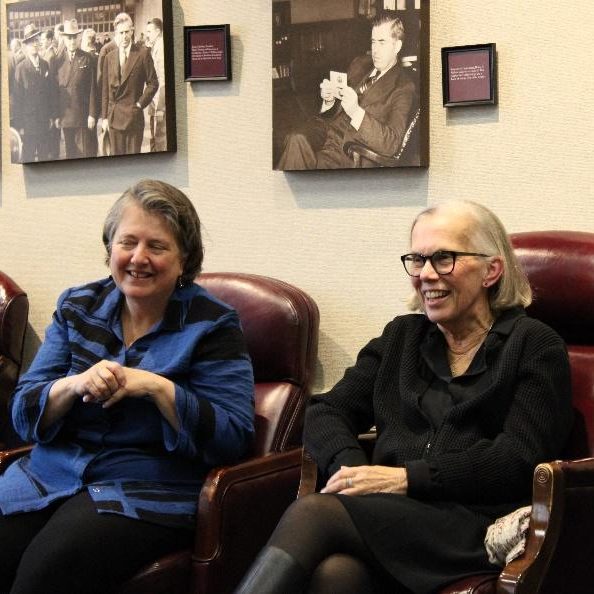By: Jocelyn Moguin, ASU Sustainable Food Systems graduate student
Note: Janie Hipp has now transitioned into a new position as President and CEO of Native Agriculture Financial Services (NAFS), and is no longer General Counsel at USDA.
Background
During our DC Immersive, my Sustainable Food Systems MS cohort had the pleasure of sitting down and listening to General Counsel Janie Hipp. Janie Hipp is the General Counsel in USDA’s Office of the General Counsel and was appointed by President Biden and confirmed by the Senate. General Counsel Hipp is an expert in agricultural law, an Oklahoma Native, and a member of the Chickasaw Nation. She is only the 4th woman to have served as General Counsel of USDA and the first Native woman to have served in her role in the nation’s history. For more details on the incredible career path and insights of General Counsel Hipp, read fellow graduate student Eleanor Ross’s impressive blog detailing her history and career.
Land Fractionation and Heirs’ Property
In our discussion with General Counsel, we learned of her interest in land ownership and land rights. For farmers across the nation, access to and use of land presents a large challenge. For beginning farmers and ranchers, this challenge can be even more daunting. For some, the challenges go beyond just finding land that can be leased or purchased to use for their operation; for others, they know where land is available, but the land suffers from high levels of land ownership fractionation and heir’s property challenges. Land fractionation can be caused by many things. For Native producers, land fractionation can be traced to the infamous Federal Indian policy of allotment, which divided and allotted Tribal lands to individual Tribal members. Once the original owners passed away, inheritors gained equal parts ownership of the allotment, causing the owners with undivided interests in the land to grow exponentially over time. Heir’s property is land that is owned by the descendants of a deceased person whose property did not clear probate. The heirs to the estate are able to use the property but do not have a clear title since any issues with the estate are unable to be solved, and land is inherited without any proof of ownership. For some individuals, the cost of clearing up a title can be cost-prohibitive. Due to this, each generation adds more and more heirs to the inheritance of the land. As more time passes and more heirs are added, the issue becomes more complex, and without proof of ownership, it is difficult for heirs to obtain needed federal farming benefits. Heirs' property is a rising issue among African American, Latinx, Indigenous, and low-income landowners and families. Land fractionation is similar to heir’s property, but the solutions are different, since the land is often under the subject of land tenure regimes that are unique to Native people. Over the years, Heirs’ property and land fractionation have both contributed to millions of acres of land loss. To stop the cycle, the current generations of farmers and landowners should focus on establishing wills, trusts, or a plan for business succession to the next generation, and federal policy needs to aggressively address these concerns. Fortunately, there are actions that can be taken now.
One of General Counsel Hipp’s other priorities, in addition to making sure future generations are able to gain access to lands in order to build their own food sourcing operations, is to ensure Tribal nations are focusing more specifically on Tribal sovereignty in food and agriculture. When asked, “How does your background bring a unique perspective to the office of General Counsel?” Janie Hipp replied that many Tribal nations and Native producers do not know who to talk to about agricultural law, as many Tribal nations do not have an agriculture department or trained agricultural lawyers within their communities. General Counsel Hipp’s own experience prior to coming to USDA has influenced this by offering support to create agriculture departments within tribal nations and expanding access to trained agricultural legal experts.
In addition, she began her work not just with Tribal nations but with everyone, including women and BIPOC communities. As a result, General Counsel Hipp has been on the ground since the beginning trying to get these farmers to understand the law. Many producers do not understand the law, and some do not have wills to pass on ownership to future generations, causing one of the biggest legal challenges the country faces today. General Council Hipp phrased it best when she said, “The world has been following guides or customary practices on how to handle food since the bible, we just now call it regulations.” For this reason, coming in with a grassroots perspective is a main priority for getting farmers to understand the law and how the law works to make sure they keep their lands and their future generations have land as well.
This blog is part of a series from the May 2023 Washington D.C. Immersive component of the Swette Center graduate programs. Students met with federal food and agriculture focused officials at USDA, the White House, and Congress alongside many other important influencers of policy in industry and non-profits.
